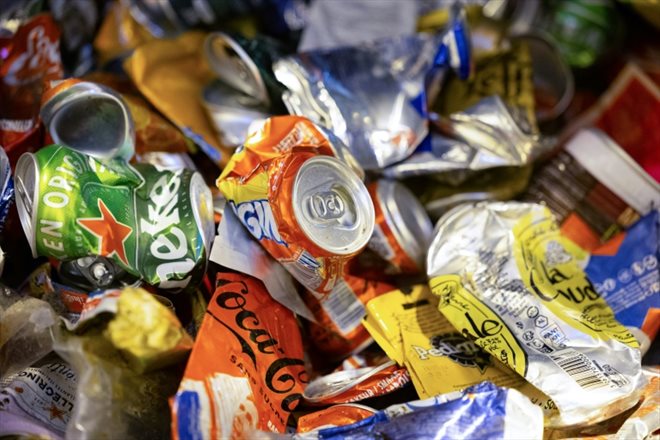Pinned by Brussels, France announced a series of measures to try to improve the sorting and recycling of its household waste and packaging (AFP/Archives/Thomas SAMSON)
“Reusable” containers, deposits, recycled plastic… MEPs voted on Wednesday to green packaging in the EU, while watering down a number of provisions, to the great dismay of environmental NGOs and against a backdrop of intense hostile lobbying from businesses.
From parcels to coffee cups, Europeans have never generated so much packaging waste: 188.7 kg per inhabitant in 2021 – a jump of 11 kg in one year, 32 kg in a decade – for a recycling rate of only 64% (40% for plastic packaging alone), according to Eurostat.
To tackle this, the European Commission has proposed legislation setting a target of 10% reduction per capita by 2035, compared to 2018, in the volume of packaging waste (-15% by 2040).
The text was the subject of a battle in the European Parliament, which adopted in plenary session numerous amendments from the PPE group (right) aimed at weakening its binding provisions, before negotiations with member states.
– Reusable packaging –
Believing that recycling is not enough, the EU is focusing on reuse and proposed imposing binding levels of packaging reuse for each sector (e-commerce, catering, drinks, etc.).
But MEPs adopted exemptions in certain cases if a minimum level of collection of the packaging concerned is reached. The wine sector would be exempt, like protected designation products.
“Broad exemptions make reuse objectives virtually ineffective, a bad signal for players in the emerging sector” of the circular economy, without reducing unnecessary packaging, deplores the coalition of NGOs Rethink Plastic Alliance.
For catering, Brussels set a target for reusable packaging for takeaway food and drinks. A measure removed in favor of a simple obligation for restaurants to accept containers brought by customers.
– Collection and recycling, targeted plastic –
The objective is to generalize targeted waste collection to maximize recycling.
The text provides for the obligation for States to establish a deposit system for plastic bottles and metal cans, if the collection rate for this waste does not reach 85% – a provision maintained despite strong opposition from the EPP.
More generally, at least 90% of packaging materials (plastic, wood, aluminum, glass, cardboard, etc.) should be collected separately by 2029.
All packaging sold should be recyclable from 2030. “This is the heart of the text (…) This legislation marks an important step forward, even if certain elements disappeared in plenary”, estimates Pascal Canfin, president (Renew, liberals) of the parliamentary Environment committee.
The text sets a minimum rate of recycled material in plastic containers.
But recycling is not a panacea: MEPs add specific targets for reducing plastic packaging waste (-10% by 2030, -20% ten years later). The sale of ultra-light plastic bags would be virtually banned.
– Camembert boxes –
Will this regulation endanger wooden Camembert boxes, for which there is no dedicated recycling channel?
To defuse this point of tension, an amendment was adopted so that the recycling obligation does not apply at this stage to wooden packaging (boxes of Camembert, Mont-d’Or, oyster baskets, etc.). ) or wax (Babybel).
– Bisphenol-A and PFAS –
MEPs have chosen to ban the intentional addition of polyfluoroalkyl compounds (PFAS, nicknamed “eternal pollutants”) and bisphenol-A (another endocrine disruptor) to food packaging. These are components that are still frequently used despite scientists’ warnings about their harmful effects.
– Single-use packaging –
The text provides for a list of single-use packaging deemed unnecessary and prohibited from 2030.
Certainly, the parliamentary text still targets miniature bottles (shampoo, gel, etc.) in the hotel industry, grouped plastic packaging or shrink films for suitcases. But elected officials removed restrictions on plastic packaging for fruits and vegetables and single-use containers for condiments.
The restoration was the subject of a standoff. Finally, the text removes the ban on single-use containers for food and drinks consumed in cafes-restaurants: a boon for fast-food chains.
The fast food sector and paper manufacturers had carried out intense lobbying in this direction, praising the “ecological” merits of cardboard packaging, potentially recyclable or from sustainable forests, compared to plastic or reuse – which according to them would require using more water and energy.
“On the circular economy, and prevention in particular, the vote in plenary ignores the reality of the figures (…) the end of disposable packaging is still far away!”, regretted the rapporteur (Renew) of the text Frédérique Ries.
The NGO Environmental Paper Network considered it “scandalous” that “all significant restrictions” were disappearing. “The few that remain will only increase the volume of paper waste. A coming disaster for the forests,” she added.
© 2023 AFP
Did you like this article ? Share it with your friends using the buttons below.




